The March 2024 IPSOS poll exclusively for Euronews reveals that fighting inflation is the top priority for Portuguese citizens. However, Portuguese voters are also concerned about social inequalities and economic growth, with little difference between the three issues.
In fact, in March 2024, less than three months before the European elections, 84% of Portuguese voters were more concerned about rising prices. In turn, 14% considered the fight against inflation to be important, but not a priority, in contrast to the 2% who believed it to be merely a secondary issue.
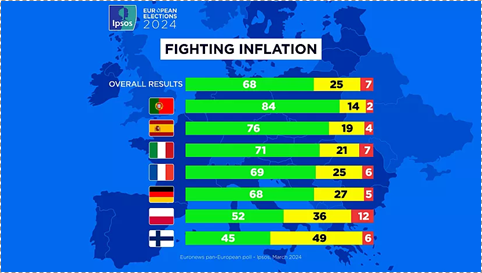
The IPSOS poll for Euronews, carried out in 18 European countries in the run-up to the elections, seeks to find out the main priorities of European citizens in these European elections: fighting inflation; reducing social inequalities and preserving social protection systems; economic growth; illegal immigration; fighting unemployment; and climate change. In Portugal, the sample is made up of 2,000 people.
With regard to the fight against social inequalities, 82% of the Portuguese point to this issue as another top priority. However, 82% of voters also consider a Europe-wide intervention necessary to stimulate Portugal’s economic growth.
The differences lie in the other categories. 15% of Portuguese respondents consider the fight against social inequalities to be important, but not a priority, and 3% somewhat secondary. With regard to economic growth, 17% said it was important, but not a priority, and 1% said it was secondary.
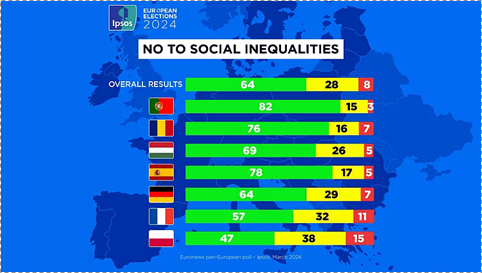
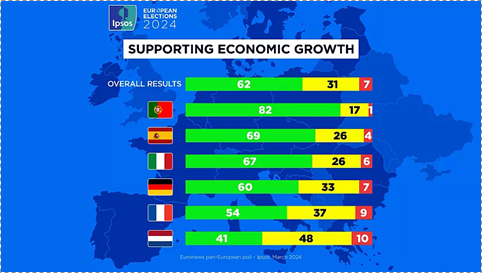
Inflation is also the top priority for European citizens
According to the same survey, as in Portugal, inflation is the issue that most worries the rest of Europe’s citizens. In fact, more than two thirds of those surveyed (68%) are concerned about the rise in the cost of living due to the inflationary crisis of 2023, felt above all in the rise in food prices.
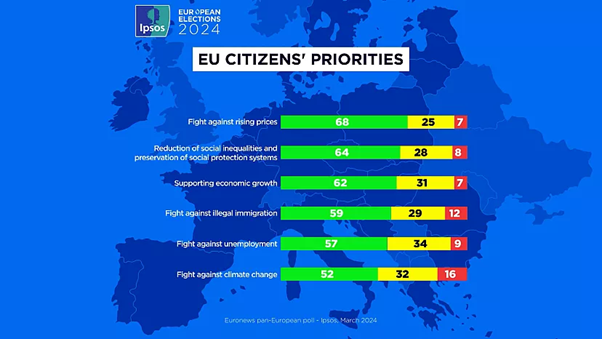
In second place, 64% of voters demand a reduction in social inequalities and the preservation of social protection systems. In third place in the table is concern about economic growth. The fourth priority is the fight against illegal immigration (59%), which reflects the growth of the far right in Europe. In fifth place is the fight against unemployment (57%) and, finally, the response to climate change (52%).
A previous study also indicated the economic crisis as the Portuguese’s biggest concern
Political scientists Ivan Krastev and Mark Leonard, who conducted a study based on a January 2024 European Council on Foreign Relations (ECFR) poll in 11 European countries, including Portugal, suggested that European voters are divided into five “crisis tribes” that correspond to the five biggest concerns: climate change, global economic turmoil, immigration, the Covid-19 pandemic and the war in Ukraine.
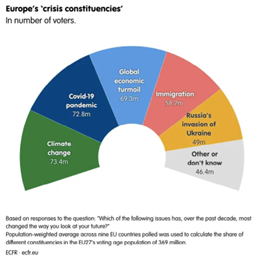
On a geographical level, each country or group of countries show dispersed concerns. In Portugal, the global economic turmoil is what worries voters the most, as 34% of those surveyed consider “this issue to be the most transformative of the last decade for their perception of the future”. In Portugal, “the scars of the 2008 and Eurozone crises are still visible” and “this legacy continues to resonate, to the point of taking precedence over all other issues”. Italian voters also point to the global economic turmoil as the issue that most affects their perception of the future.
In turn, the second biggest concern for the Portuguese is the Covid-19 pandemic (23%). In third place is climate change (17%), followed by the war in Ukraine (14%). Immigration and the “other” category were tied at 4%. Finally, 5% answered that they couldn’t indicate which of the five options had most changed their perception of the future.
In both polls (the IPSOS poll exclusively for Euronews in March 2024 and the European Council on Foreign Relations poll in January 2024), the top concern is the economic crisis expressed through rising prices.
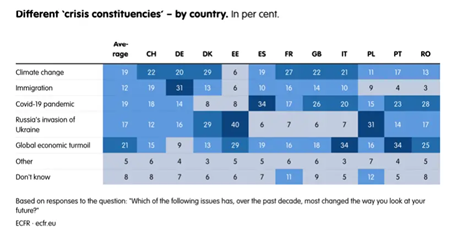
As far as European voters are concerned, the issues they are most concerned about are climate change and the Covid-19 pandemic, with Denmark and Spain being the most expressive, respectively. In third place is the economic crisis, led by Portugal and Italy. Then there’s immigration, which is most prominent in Germany, and finally the war between Ukraine and Russia, which is the issue that Estonians are most concerned about compared to other European countries.
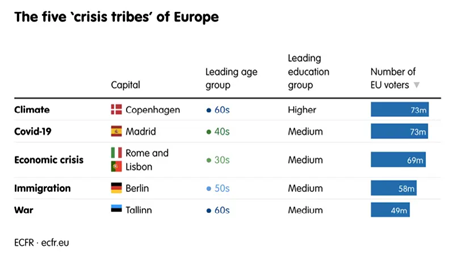
It’s interesting to note that for Ivan Krastev, co-author of the report and president of the Center for Liberal Strategies in Sofia, Bulgaria’s capital, “European citizens are moving away from the ideological moorings of right and left in the context of how they view politics in the EU, and are now guided by their attitudes towards the crises that have impacted their lives in recent years.”
“A crisis of one’s own: navigating Europe’s fractured politics”, the ECFR study, was based on public opinion polling carried out by YouGov, Datapraxis and Norstat in nine EU member states (Germany, Denmark, Spain, Estonia, France, Italy, Poland, Portugal and Romania, which represent 75% of the EU population) and two outside countries (Great Britain and Switzerland).
In Portugal, the poll was carried out between September 26 and October 4, 2023, a period that preceded the political crisis created by the resignation of the former prime minister, António Costa, on November 7, 2023, which led to early parliamentary elections being scheduled for March 10, 2024.
Conclusion
In short, according to the IPSOS poll exclusively for Euronews, when it comes to the priorities of Portuguese citizens in these European elections, the fight against inflation gets the most votes. However, the difference between the two other issues is not significant: two percentage points. The fight against social inequalities and economic growth are the other issues that most concern the Portuguese. In general, the priorities of the Portuguese are similar to those of European citizens. However, among all those surveyed, Euronews says that the Portuguese are most concerned about inflation, social inequalities and economic growth. In our assessment, we believe that the headline given to the Euronews story is not entirely accurate, because the poll only covered two thirds of the countries in the European Union (18 out of 27). In other words, we can’t say (because we don’t know) whether the inhabitants of any of the other nine member states are more concerned about inflation than the Portuguese. To conclude, the study carried out by the European Council on Foreign Relations (ECFR) in January 2024, in only 11 European countries, including Portugal, indicates that the greatest concern of the Portuguese is the economic crisis.
RESEARCH | ARTICLE © Raquel Silva Alves e Sousa, University of Porto, Portugal
Leave your comments, thoughts and suggestions in the box below. Take note: your response is moderated.





